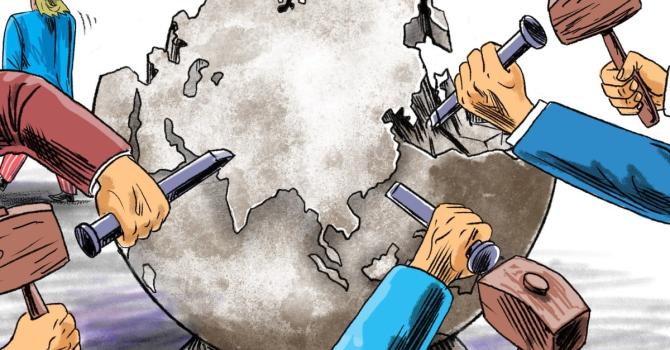SCMP: How the US’ rise as an energy exporter puts it on a dangerous path with China, and the environment
Christine Loh says the US’ energy production boost is encouraging Washington to discard environmental regulations and become more confrontational on the global stage, particularly with Beijing
Energy drives global progress. It determines geopolitics, and a major shift has been under way in crude oil and natural gas drilling and production that is reverberating through energy markets and affecting policies around the world: the United States is turning from a major energy importer to a major exporter.
US crude oil production is at an all-time high and will continue to grow. The rise of a new supplier with significant capacity affects the Middle East and Russia, traditional major exporters, as well as China, much of Asia and Europe – major importers.
America’s energy fortune changed because of the maturation of hydraulic fracturing, or “fracking” – a crude oil and natural gas extraction technology enabling the country’s rapid surge in production. The US is already the biggest producer of natural gas in the world, and is projected to become the third-largest exporter in liquefied natural gas by 2020.
The US’ meteoric energy rise is causing major disruptions in prices. A decade ago, oil prices were close to a high of US$150 per barrel. Exporting countries were doing very well and importing countries had to cough up. Prices have more than halved since then.
Another disruption is job opportunities. The American energy sector has been hiring. Moreover, with cheaper energy sources in America, it may make sense for the chemical industry to consider relocating more production there.
Besides, natural gas can displace coal in electricity generation and is an environmentally cleaner option. Hong Kong is doing precisely that in local electricity generation – replacing coal with natural gas. In other words, coal producers are also affected. Indeed, there is great demand for LNG all around the world because it is a cleaner fossil fuel.
With China a huge market for oil and gas imports, Sino-US relations could be an affair made in heaven. Over the past few years, China became one of the US’ major buyers of LNG and was on the way to becoming the biggest importer, probably by 2019. The US trade deficit with China could have been greatly reduced with long-term LNG supply contracts.
Yet, earlier in the year, China started to scale back from buying American LNG as the US-China trade war loomed. With US tariffs in place, China’s retaliatory tariffs mean buying energy products from the US doesn’t make commercial sense.
US energy producers are private-sector players and they are ensnared by the trade war like other industry sectors. Many need long-term contracts to continue expanding production. Chinese contracts would help, but that is off the table – at least for now. It would be another blow should the US restrict Chinese investment in oil and gas production.
While America’s new-found energy abundance can be used as a foreign policy tool to exert clout, other countries are not blind to Washington’s motives for maintaining its dominance. Thus, judiciousness is called for from the US.
For example, US officials have openly said that moving American energy supplies into Eastern Europe is a powerful way to contain Russia’s influence. Nevertheless, challenging Russia there is no small feat since it is a well-entrenched energy supplier.
As for supplying China, the US now sees China as a strategic competitor not only in trade but also in technology, military strength, diplomatic influence and political ideology. How the trade war will pan out is unclear. Affected parties are hunkering down for a prolonged punch-up between the two countries.
There is another issue: American plenitude in energy presents a temptation to be profligate.
For over a decade, concerns over the world reaching “peak oil” – that oil production would start to decline – has driven the auto industry worldwide to make vehicles that are much more fuel efficient. Reducing carbon emissions from fossil fuels to mitigate climate change is also a driver for change.
Yet, the US is now proposing to freeze auto fuel economy standards for cars and trucks through to 2026. This is a significant regulatory reversal that would affect its domestic fuel consumption – US officials estimate it would increase domestic oil usage by 500,000 barrels a day – as well as air quality, public health and climate change.
The US’ proposal does not mention climate change, as the current administration has chosen to ignore the science that the rest of the world has accepted.
US authorities have emphasised that America, as “the world’s largest oil producer” that is “expected to become a net petroleum exporter in the next decade”, should take advantage of its cost-effective oil extraction capability.
This sounds like a policy to consume energy because it is there. This attitude will bleed out beyond the auto industry to other areas of the US economy.
Beyond environmental concerns, this could well have military and geopolitical effects, as well. American policymakers today believe its role as a world leader will be made that much stronger by being the top dog in energy production.
China, being the largest auto market, is continuing to tighten vehicle fuel economy standards, as it has a massive interest in reducing fuel consumption, improving air quality and public health, as well as lead in fighting climate change since the US stepped back from international carbon-reduction commitments in the Paris Agreement.
How things will play out in energy markets, environmental impacts and the US-China trade war won’t be fully visible until much later, when statistics become available. A safe bet is things won’t be pretty.
Christine Loh is chief development strategist and adjunct professor at the Hong Kong University of Science and Technology’s Division of Environment and Sustainability
This article appeared in the South China Morning Post print edition as:
Link to SCMP article: https://www.scmp.com/comment/insight-opinion/article/2162986/how-us-rise-energy-exporter-puts-it-dangerous-path-china-and



